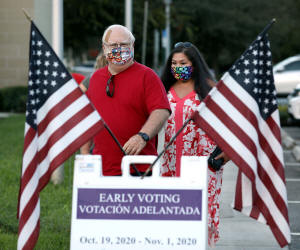How the U.S. early vote surge is shaping Trump, Biden endgames
 Send a link to a friend
Send a link to a friend
 [October 29, 2020]
By Simon Lewis, Jarrett Renshaw and Joseph Ax [October 29, 2020]
By Simon Lewis, Jarrett Renshaw and Joseph Ax
(Reuters) - Democrats say their advantage
in early voting has allowed Joe Biden's presidential campaign to sharpen
its get-out-the-vote operation by targeting a smaller universe of
potential supporters, while Republicans brace for an all-or-nothing
scramble to turn out votes for President Donald Trump on Nov. 3.
Early voting, both by mail and in-person, has surged to record highs,
with Americans energized by a high-stakes election while also worried
about crowded polling places amid the coronavirus pandemic. State data
on who has voted early show ballots cast by registered Democrats so far
outpacing those cast by registered Republicans.
A voter's party affiliation does not necessarily indicate which
candidate they backed. But polls show the vast majority of early votes
cast by registered Democrats are likely for Biden, setting up the
prospect that the candidate will have a sizable lead heading into
Election Day, including in crucial battleground states such as
Pennsylvania, North Carolina and Arizona.

Across the 20 states that publish the party registration of early
voters, more than 17.4 million registered Democrats had voted by
Wednesday compared with 10.8 million registered Republicans, according
to figures compiled by the U.S. Elections Project at the University of
Florida.
About 47 million Americans who have voted so far either are not
affiliated with a party or live in a state that does not publicly report
a voter's party affiliation.
The Trump campaign did not respond to questions about the importance of
Election Day turnout to the president's hopes of winning a second term.
But Republicans contend the Democratic early ballots have merely
"cannibalized" Biden's Election Day vote, with most Democrats simply
shifting to another day.
Biden's campaign acknowledged that many, if not most, of its early
voters would have shown up on Election Day anyway. Still, having so many
votes already cast allows them to focus their resources either on
convincing infrequent voters to come out to the polls, or on persuading
independent or even Republican-leaning voters who have yet to decide,
officials said.
"Every time someone votes, we can remove them from our universes," Becca
Siegel, the campaign's chief analytics officer, told Reuters. "As more
people vote, we can talk to our core sporadic-voting Democrats more. We
can also expand our universe to even lower-propensity voters. That's
something we can do that the other side cannot."
In a year upended by all manner of unexpected happenings, banked votes
also serve as an insurance policy in the event that COVID-19, weather or
some other disruption keeps voters away from the polls on Nov. 3, said
Josh Mendelsohn, chief executive of Hawkfish, a Democratic data firm.
"You stop sweating turnout on Election Day," Mendelsohn said.
Republican officials, meanwhile, are stepping up their get-out-the-vote
efforts. In Pennsylvania, where registered Democrats account for 69% of
the nearly 2 million early votes cast so far, Republicans are texting
those who have requested mail ballots but have yet to return them.
Republicans also are making plans to bring a carnival-like atmosphere to
polling lines on Nov. 3.
In Northampton, a swing county that Trump won by 4 percentage points in
2016, volunteers plan to set up tents and Trump flags at the 10
most-active polling places to motivate voters, said Lee Snover, head of
the Republican Party in the county. The volunteers also will hold a
voter's place in line if they need to pick up their kids, she said.
"We only have hours to make this happen, so we need to make sure we get
every vote," Snover said.

Jim Worthington, who owns an upscale fitness center in the Philadelphia
suburbs, founded a pro-Trump group to help the president win
Pennsylvania's suburban Bucks County and keep the competitive 1st
Congressional District in Republican hands. He said he spent $500,000 to
identify and reach out to roughly 15,000 people who do not regularly
vote. The money was first spent to convince them to vote by mail, but
will turn to a door-knocking and phone campaign as Election Day nears.
"It's a turnout election, and we need a huge turnout," Worthington said.
Republicans have long embraced mail balloting, but they have shifted to
in-person voting amid repeated, unfounded attacks from Trump who says
the system is plagued by widespread fraud. With the data indicating that
many Democrats have already voted, some Republican strategists say Trump
may now need a massive single-day turnout of his supporters to counter
the early Biden advantage at a time when coronavirus cases are surging.
"That was always going to be the risk Republicans faced. If there was a
(COVID-19) spike, and obviously there is a spike, that could be a real
problem," said Amy Koch, a Republican strategist from Minnesota, one of
several northern battleground states where virus case rates are rising
rapidly.
Trump continues to hold massive rallies where many attendees shun masks,
a sign his supporters are unfazed by the health risks.
"I ask you one little favor: get the hell out and vote," Trump told
thousands gathered in chilly Nebraska on Tuesday.
GYROS IN IOWA
More than 75 million Americans had already cast ballots as of Wednesday.
That's by far the most-ever in early voting, and it's more than half the
final turnout of 138 million votes recorded in the 2016 election. The
staggering figures have prompted some analysts to predict the highest
turnout rate in a century.
The actual votes for each candidate won't be known until polls close,
perhaps with a lag of days or more.
[to top of second column]
|

People arrive to cast their ballots just after sunrise
during early voting in Celebration, Florida, U.S., October
25, 2020. REUTERS/Gregg Newton

Pollsters have long predicted Biden voters would dominate mail-in
voting after Trump's repeated, unsubstantiated claims that it would
be ridden with fraud. Still, many registered Republicans have taken
advantage of early in-person voting, so far showing up in greater
numbers than Democrats in Florida, for instance.
Democratic data firm Hawkfish, which uses demographic data from
polls to model which candidate a voter would likely support, gives
Biden a lead of more than 3 million votes across Arizona, Florida,
Michigan, North Carolina, Pennsylvania and Wisconsin, according to
data shared with Reuters through Oct. 25.
The Biden campaign said most Democratic early voters were reliable
supporters that the campaign had been counting on to cast ballots.
Banking them early has bought the campaign more time to focus on
people who lean Democratic but might not always turn up at the
polls.
The campaign can also expand its persuasion targets, turning its
attention to "soft Trump" supporters as more "soft Biden" supporters
have voted, according to Siegel, the campaign's chief analytics
officer.
The campaign uses data to identify specific television networks that
their target voters are watching. As more Democrats have voted,
conservative-leaning Fox News has risen in importance as a
persuasion tool, Siegel said, though she wouldn't say whether the
campaign planned to alter its ad buys there.
Biden's campaign has spent just over $3 million on Fox News ads in
October, more than any other cable network, according to Advertising
Analytics, an ad tracking firm.

In Iowa, a state Trump won comfortably in 2016 but where polls show
a competitive race, Democrats in Polk County, which contains the
city of Des Moines, have returned their absentee ballots rapidly and
in large numbers.
That has freed up the party's time to court communities less likely
to vote, said Sean Bagniewski, the Polk County Democratic chair. He
said the party is handing out Bosnian gyros at a mosque to reach the
Bosnian refugee community and serving tamales at a Hispanic-owned
grocery store.
"Usually we don't have that bandwidth because we're focusing on so
many people," he said.
'WHO'S LEFT'
In Florida, more than 45% of the state's 14 million registered
voters have already cast their ballots, reflecting enthusiasm on
both sides of the contest.
While Republicans trail registered Democrats in overall early voting
by about 250,000 votes due largely to their lower use of mail
ballots, they have been closing that gap by voting in-person in
higher numbers, state data show.
About 20% of voters in the state have no party affiliation. Nearly
one-third of unaffiliated Florida early voters this year were not
registered or did not vote in 2016, said Daniel Smith at the
University of Florida.
Hawkfish, the Democratic data firm, estimates 56% of those who have
voted already in Florida were likely Biden voters, compared to 44%
for Trump.
Republicans, meanwhile, say they are using detailed data on
registered voters to identify those who may lean toward Trump.
Trump's campaign has 190 staff and about 60,000 volunteers in
Florida, whose 29 Electoral College votes are key to Trump winning
re-election.
"We know every day exactly who voted, we know who's left, we know
who we think is supportive of the president. So it's our job to turn
those voters out," said Joe Gruters, chairman of the Florida
Republican Party.
Trump is also hoping a frantic schedule of rallies in battleground
states - each attended by thousands of his most ardent supporters -
will deliver him more votes. On Monday, he made three stops in
Pennsylvania, his 14th visit to the state since June.
In the state's Allegheny County, which includes Pittsburgh,
Republican chairman Sam DeMarco has personally texted all of the
Republican voters in his county who requested an absentee ballot but
didn't turn them in.

Volunteers from as far away as Alabama and Texas have traveled with
a group called the "Mighty American Strike Force" to knock on doors
in the suburbs of Pittsburgh and to make phone calls to voters, he
said.
"We are doing things that we've never done before to get our vote
out," DeMarco said.
(Reporting by Simon Lewis, Jarrett Renshaw and Joseph Ax. Editing by
Soyoung Kim and Marla Dickerson)
[© 2020 Thomson Reuters. All rights
reserved.] Copyright 2020 Reuters. All rights reserved. This material may not be published,
broadcast, rewritten or redistributed.
Thompson Reuters is solely responsible for this content. |